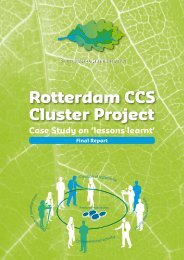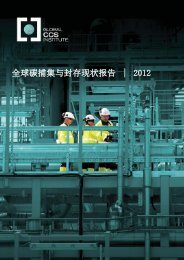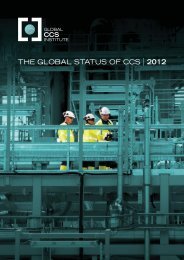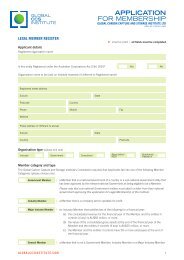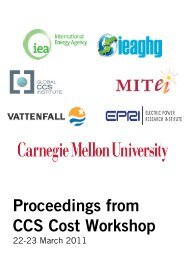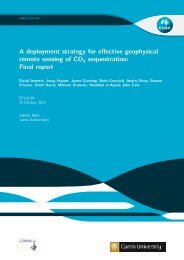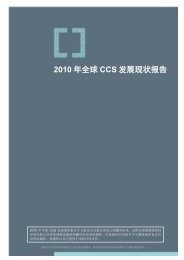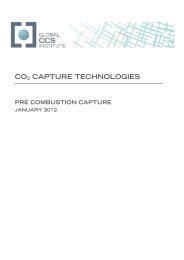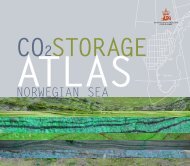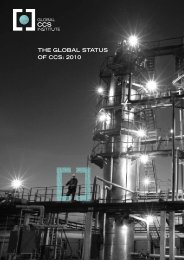Perceptions of CO2 Report - Global CCS Institute
Perceptions of CO2 Report - Global CCS Institute
Perceptions of CO2 Report - Global CCS Institute
- No tags were found...
Create successful ePaper yourself
Turn your PDF publications into a flip-book with our unique Google optimized e-Paper software.
formed their opinion using the <strong>CCS</strong> information provided and their own values, beliefs, knowledge,ways <strong>of</strong> thinking, and other life experiences.Generally the higher participants self-rated their knowledge, the more concrete their opinions were.This was apparent in the portion <strong>of</strong> neutral opinion decreased as the <strong>CCS</strong> knowledge <strong>of</strong> theparticipants increased. This tendency appears especially clearly in the instance <strong>of</strong> <strong>CCS</strong> “in yourcountry”, as the portion <strong>of</strong> supportive opinion increased as <strong>CCS</strong> knowledge <strong>of</strong> participantsincreased (except <strong>of</strong> those who already knew a lot about <strong>CCS</strong>). However, in terms <strong>of</strong> opinionsabout <strong>CCS</strong> “<strong>of</strong>fshore”, the tendency was weak. This implies it is harder to form opinions about“<strong>CCS</strong> <strong>of</strong>fshore” compared with “<strong>CCS</strong> in your country” by gaining knowledge about <strong>CCS</strong> provided inthis research.To investigate factors related to the formation <strong>of</strong> first opinions on <strong>CCS</strong> implementation, weconducted three regression analyses using opinions on the implementation <strong>of</strong> the three differenttypes <strong>of</strong> <strong>CCS</strong> as dependent variables and characteristics <strong>of</strong> participants as covariates. Table 17 inAppendix F shows the results <strong>of</strong> the best regression. Results showed that the adjusted R-squared(0.134 – 0.173) indicates the regressions did not fully explain the factors that influencerespondents’ opinion formation about <strong>CCS</strong> implementation. This result implies that many otherfactors influence a person’s willingness or support for letting a <strong>CCS</strong> project proceed.Second assessmentAfter additional information was provided, we asked the same set <strong>of</strong> questions in the secondassessment regarding implementation <strong>of</strong> <strong>CCS</strong>. Figure 13Error! Reference source not found.shows the percentage breakdown <strong>of</strong> opinions participants stated for each <strong>of</strong> the threeimplementation questions. The majority <strong>of</strong> respondents (66% for <strong>CCS</strong> “in your country”, 69% for<strong>CCS</strong> “in your neighbourhood”, and 67% for <strong>CCS</strong> “<strong>of</strong>fshore”) maintained the same opinions for eachquestion across the two assessments. Those who changed opinions moved in either a positive ornegative direction; but across the three questions more participants became increasingly negativerather than positive. As a result, in the second assessment the portion <strong>of</strong> neutral opinionsdecreased considerably; and the level <strong>of</strong> negative opinion increased significantly compared withthe first assessment.Figure 13: Opinion on <strong>CCS</strong> implementation by all participants (Second assessment)Note: For clarification, ‘onshore’ in the graph refers to ‘in your neighbourhood’ proximity34 | Understanding how individuals perceive carbon dioxide




